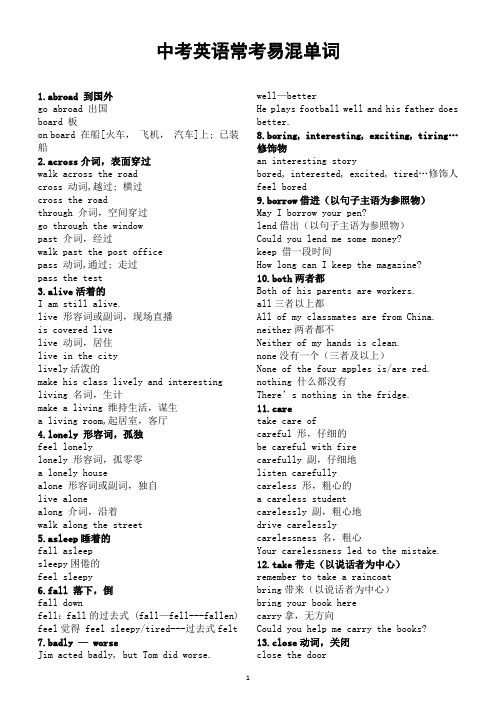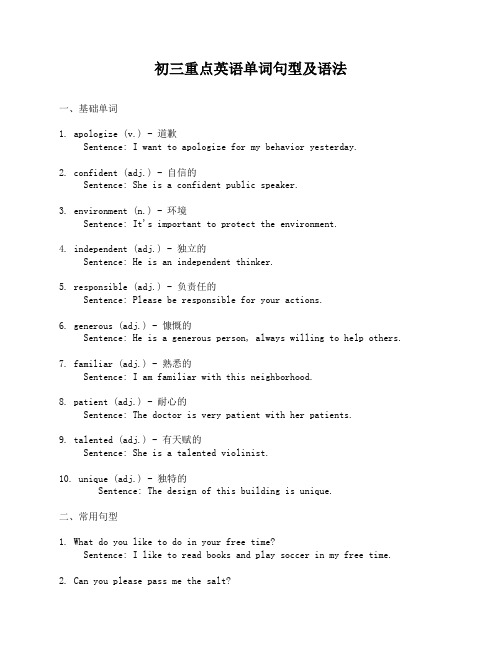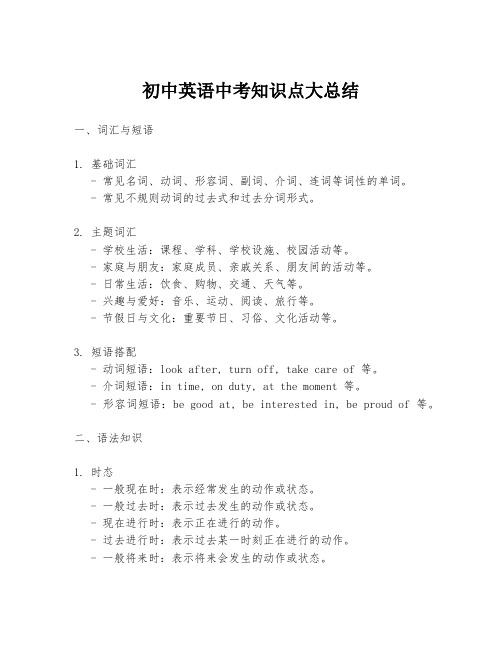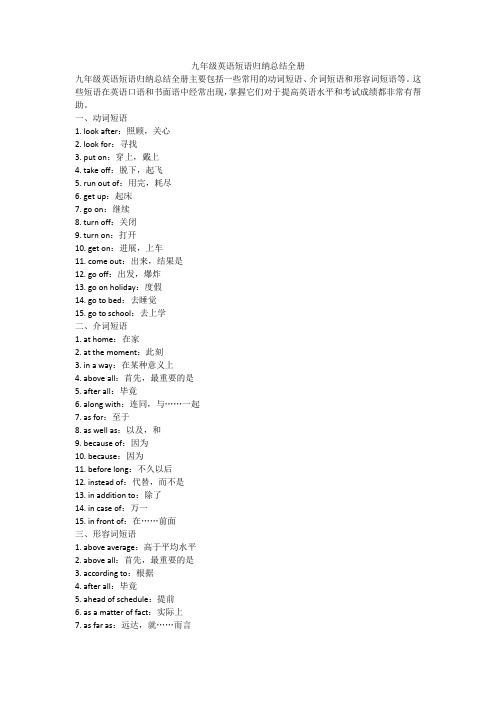初中英语中考常用词汇词组短语用法区分(共24组)
中考英语_重要考点_短语_词组归纳(免费)

《中考英语重要考点,短语,词组归纳》【一】、短语、词组归纳:由动词开头构成的短语、词组很多。
复习时应分类处理:一、动词+介词1.look at…看…,look like … 看上去像……,look after …照料…2.listen to…听……3.welcome to…欢迎到……4.say hello to …向……问好5.speak to…对……说话此类短语相当于及物动词,其后必须带宾语,但宾语无论是名词还是代词,都要放在介词之后。
如:This is my new bike. Please look it after.(×)This is my new bike. Please look after it.(√)二、动词+副词“动词+副词”所构成的短语义分为两类:A.动词(vt.)+副词1.put on 穿上2.take off脱下3.write down记下此类短语可以带宾语,宾语若是名词,放在副词前后皆可;宾语若是人称代词,只能放在副词的前面。
试比较:First listen to the tape, then write down the answer/write the answer down. (√)First listen to the answer, then write down it.(×)First listen to the answer, then write it down.(√)B.动词(vi)+副词。
1.come on赶快2.get up起床3.go home回家4.come in进来5.sit down坐下6.stand up起立此类短语属于不及物动词,不可以带宾语。
三、其它类动词词组1.close the door2.1ook the same3.go to work/class4.be ill5.have a look/seat6.have supper7.1ook young8.go shopping9.watch TV/games10. play games【二】、介词短语聚焦“介词+名词/代词”所构成的短语称为介词短语。
中考英语重点单词和短语用法大总结

中考英语重点单词和短语用法大总结一.重点单词用法总结:1. succeed - v. 成功- succeed in + 动名词 / 名词 / doing sth. - 在事上成功2. access - n. 进入,接近- have access to + 名词 - 能够接触事物3. advantage - n. 优势- take advantage of - 利用/趁...之机4. aim - n. 目标, v. 瞄准,旨在- take aim at - 瞄准物5. avoid - v. 避免- avoid + 动名词 / doing sth. - 避免做事6. behavior - n. 行为- behavior towards / toward - 对待...的行为7. benefit - n. 利益, 有益于, v. 有益于- benefit from - 从...中受益8. celebrate - v. 庆祝- celebrate + 假日/事件 - 庆祝一些假日/事件9. challenge - n. 挑战, v. 向...挑战- rise to the challenge - 迎接挑战10. contribute - v. 贡献, 捐赠- contribute to - 对...有贡献11. deceive - v. 欺骗- deceive + sb. into + 动名词 / doing sth. - 欺骗人做事12. determine - v. 决定,确定- determine to + 动词原形 - 决定要做事13. encourage - v. 鼓励- encourage + 名词 - 鼓励人/物14. equal - adj. 相等的- be equal to - 相等于15. establish - v. 确立,建立- establish + 名词 - 建立事物16. experience - n. 经验, v. 经历- gain / acquire experience - 获得经验17. include - v. 包括- include + 名词 - 包括事物18. increase - v./n. 增加- increase + 名词 - 增加事物19. influence - n. 影响, v. 影响- have / exert influence on - 对...有/施加影响20. introduce - v. 介绍- introduce + 名词 - 介绍人/物21. involve - v. 涉及,包括- involve + 名词/动名词 - 涉及/包含事物22. maintain - v. 维持- maintain + 名词/形容词 - 维持事物23. modify - v. 修饰,修改- modify + 名词/形容词 - 修改事物24. object - n. 物体, v. 反对- object + to + 名词/动名词/动词-ing - 反对事物/做事25. occur - v. 发生- occur + 名词/动名词 - 发生事物二.重点短语用法总结:1. by accident - 偶然地- I met her by accident at the supermarket.2. at ease - 放松- Please make yourself at ease.3. in charge - 负责- He is in charge of the project.5. in fact - 事实上- He is not a doctor. In fact, he is a nurse.6. in order to - 为了- I wake up early in order to catch the bus.7. on purpose - 故意- He dropped the glass on purpose.8. up to - 高达, 至多9. with the help of - 在...的帮助下- She finished the project with the help of her friends.。
初中英语2024届中考复习常考易混单词和短语

中考英语常考易混单词1.abroad 到国外go abroad 出国board 板on board 在船[火车,飞机,汽车]上; 已装船2.across介词,表面穿过walk across the roadcross 动词,越过; 横过cross the roadthrough 介词,空间穿过go through the windowpast 介词,经过walk past the post officepass 动词,通过; 走过pass the test3.alive活着的I am still alive.live 形容词或副词,现场直播is covered livelive 动词,居住live in the citylively活泼的make his class lively and interesting living 名词,生计make a living 维持生活,谋生a living room,起居室,客厅4.lonely 形容词,孤独feel lonelylonely 形容词,孤零零a lonely housealone 形容词或副词,独自live alonealong 介词,沿着walk along the street5.asleep睡着的fall asleepsleepy困倦的feel sleepy6.fall 落下,倒fall downfell:fall的过去式 (fall—fell---fallen) feel觉得 feel sleepy/tired---过去式felt 7.badly — worseJim acted badly, but Tom did worse. well—betterHe plays football well and his father does better.8.boring, interesting, exciting, tiring…修饰物an interesting storybored, interested, excited, tired…修饰人feel bored9.borrow借进(以句子主语为参照物)May I borrow your pen?lend借出(以句子主语为参照物)Could you lend me some money?keep 借一段时间How long can I keep the magazine?10.both两者都Both of his parents are workers.all三者以上都All of my classmates are from China. neither两者都不Neither of my hands is clean.none没有一个(三者及以上)None of the four apples is/are red. nothing 什么都没有There’s nothi ng in the fridge.11.caretake care ofcareful 形,仔细的be careful with firecarefully 副,仔细地listen carefullycareless 形,粗心的a careless studentcarelessly 副,粗心地drive carelesslycarelessness 名,粗心Your carelessness led to the mistake. 12.take带走(以说话者为中心)remember to take a raincoatbring带来(以说话者为中心)bring your book herecarry拿,无方向Could you help me carry the books?13.close动词,关闭close the doorclose 形容词,亲密的my closest friendclosed形,关着的keep the door closed14.closely副,密切地work closely with us15.brave形,勇敢的He is brave enough to save the old man. courage 名,勇气have the courage to tell him the bad news bravely 副,勇敢地face the difficulties bravely16.dead形容词,死的have been deaddie动,死亡die of hungerdeath名,死亡the death of his pet makes him so sad. 17.especially副,尤其He is good at all subjects, especially maths.specially副,专门The pen is specially designed for the boy. special形,特殊的a special day18.except除了All the students except Tom will go for a school trip.expect期待You are expected to bring it back when you return.19.excited形,激动的,修饰人feel excitedexciting形,激动人心的,修饰物an exciting filmexcitedly 副词,修饰动画shouted excitedlyexcitement名词shout with excitement20.a little一些,修饰不可数名词a little moneya few一些,修饰可数名词a few treeslittle几乎没有,修饰不可数名词There’s little water in the glass, is it? few几乎没有,修饰可数名词so few students21.form 形成form a good reading habitfrom 从……22.France法国/ French 法语German德国的/ Germany 德国23.hard努力work hardhardly几乎不The boy hardly does his homework.24.healthy健康的keep healthyhealth健康it’s good for your healthhealthily健康地eat healthily25.if如果主将从现If he comes, I’ll call you.是否I don’t know if he will come here. whether是否(如与or连用,则用)I wonder whether he’ll come or not. weather 天气What will the weather be like tomorrow?26.include 动词,包括The list includes the names of many famous writers.including 介词,包括They have many pets, including three cats.27.invent动词发明Edison invented a lot of things. invention名词发明The invention made much difference to humans.inventor名词发明者Edison was a great inventor.st 上一个的last year;最后的make her last apperance动词,持续The meeting will last one and a half hours. lasting 形,持久的a lasting value29.lie名词,谎言tell a lie动词,说谎He is always lying to us.动词,位于Japan lies to the east of China.动词,躺,平放He likes lying on the grass.躺,平放;位于:lie—lay---lain说谎:lie-lied-lied30.luck名,运气good lucklucky 形,幸运的a lucky numberluckily 副,幸运的是Luckily, we got better marks.unlucky/unluckily31.noise名,噪音Don’t make any noise.noisy 形,吵闹的much too noisynoisily 副,吵闹地talk noisily32.noise 名词,噪音sound 名词,声音We sat listening to the sound of the waves sound 动词,听起来The music sounds beautiful.voice 名词,嗓音The singer has a sweet voice.33.provide提供provide a chance for the boy=provide the boy with a chanceoffer 提供offer a chance to the boy=offer the boy a chance34.other别的,加名词other studentsanother另一个I don’t like the pair of shoes, would you like to show me another pair?the other 两个中的另一个,常用one…the otherHere is a shoe, where’s the other one? others= other+名词35.over/ under年龄的上下above/ below温度,楼层的上下36.peace名词,和平love peacepeaceful形,宁静的a peaceful villagepeacefully 副,和平地we hope to solve the problem peacefully.37.pleasure名,乐意。
初三重点英语单词句型及语法

初三重点英语单词句型及语法一、基础单词1. apologize (v.) - 道歉Sentence: I want to apologize for my behavior yesterday.2. confident (adj.) - 自信的Sentence: She is a confident public speaker.3. environment (n.) - 环境Sentence: It's important to protect the environment.4. independent (adj.) - 独立的Sentence: He is an independent thinker.5. responsible (adj.) - 负责任的Sentence: Please be responsible for your actions.6. generous (adj.) - 慷慨的Sentence: He is a generous person, always willing to help others.7. familiar (adj.) - 熟悉的Sentence: I am familiar with this neighborhood.8. patient (adj.) - 耐心的Sentence: The doctor is very patient with her patients.9. talented (adj.) - 有天赋的Sentence: She is a talented violinist.10. unique (adj.) - 独特的Sentence: The design of this building is unique.二、常用句型1. What do you like to do in your free time?Sentence: I like to read books and play soccer in my free time.2. Can you please pass me the salt?Sentence: Sure, here you go.3. I'm sorry, but I can't attend the party tonight.Sentence: That's okay, maybe next time.4. How was your weekend?Sentence: My weekend was great, I went hiking with my family.5. Could you please help me with my homework?Sentence: Of course, I would be happy to help.6. What time does the movie start?Sentence: The movie starts at 7:30 PM.7. Where is the nearest bus stop?Sentence: The nearest bus stop is just around the corner.8. I'm really excited about the school trip next week.Sentence: Me too, it's going to be a lot of fun.9. What do you want to be when you grow up?Sentence: I want to be a doctor and help people.10. How do you spell your name?Sentence: My name is spelled J-O-H-N.三、语法1. Present Simple Tense (一般现在时)- 表示经常发生的动作或事实。
初中英语中考知识点大总结

初中英语中考知识点大总结一、词汇与短语1. 基础词汇- 常见名词、动词、形容词、副词、介词、连词等词性的单词。
- 常见不规则动词的过去式和过去分词形式。
2. 主题词汇- 学校生活:课程、学科、学校设施、校园活动等。
- 家庭与朋友:家庭成员、亲戚关系、朋友间的活动等。
- 日常生活:饮食、购物、交通、天气等。
- 兴趣与爱好:音乐、运动、阅读、旅行等。
- 节假日与文化:重要节日、习俗、文化活动等。
3. 短语搭配- 动词短语:look after, turn off, take care of 等。
- 介词短语:in time, on duty, at the moment 等。
- 形容词短语:be good at, be interested in, be proud of 等。
二、语法知识1. 时态- 一般现在时:表示经常发生的动作或状态。
- 一般过去时:表示过去发生的动作或状态。
- 现在进行时:表示正在进行的动作。
- 过去进行时:表示过去某一时刻正在进行的动作。
- 一般将来时:表示将来会发生的动作或状态。
2. 语态- 被动语态:表示动作的承受者。
- 常见时态的被动语态形式。
3. 非谓语动词- 动名词:作为名词使用,表示动作。
- 分词:现在分词和过去分词,用作形容词或副词。
- 不定式:作为名词、形容词、副词等。
4. 情态动词- can/could, may/might, must, should/ought to 等。
- 表示可能性、建议、义务等。
5. 代词- 人称代词、物主代词、反身代词、指示代词、疑问代词等。
6. 连词- 并列连词:and, but, or, so 等。
- 从属连词:because, since, although, if, when 等。
7. 句子结构- 简单句、复合句、复杂句。
- 陈述句、疑问句、祈使句、感叹句。
8. 特殊句式- 倒装句:表示强调或条件。
- 省略句:在某些情况下可以省略句子的某些成分。
初中英语中考考点词汇精讲(共26个)

中考英语考点词汇精讲1.well&good两者都可以表示“好”的意思。
well是副词,用于修饰动词。
例如:Tom speaks Chinese well.汤姆的汉语说得好。
He sings well.他唱得好。
good是形容词,用作定语或表语。
例如:She is a good doctor.她是个好医生。
His pronunciation is very good.他的发音很好。
well作形容词时,指的是健康状况良好。
例如:He is quite well.他身体好。
I hope you will be well soon.我希望你很快好起来。
2.no&notno 表示“不”,修饰可数名词单数时no=not a; 修饰可数名词复数或者不可数名词时no=not any。
例如:I have no book.=I don’t have a book.I have no books.= I don’t have any books.There is no water in the cup.=There isn’t any water in the cup.no 常用来做否定回答,与yes相对应,not不可以。
例如:Do you like bananas? No, I don’t.不可以说Not, I don’t.not 用于否定句,放在助动词或者be动词后面表示否定,no 不可以。
例如:我们可以说I don’t like tea.不可以说I do no like tea.3.foodfood泛指“食物”,“食品”,通常用做不可数名词。
例如:I like Chinese food.我喜欢中国食品。
We should eat healthy food every day.我们每天应该吃健康食品。
food指食物的种类时是可数名词。
例如:Milk is a good food.牛奶是一种好食品。
Too many sweet foods, like cakes and pastry, may make you fat.太多的甜食,像蛋糕和点心,可能会使你发胖。
中考英语常用词组及用法解析#精选.

the other 指两个人或事物中的 “另一个 ”,表示特指。
如: W e 辨析集词、、 stood on one side of the road and they stood on the 等的考察,主要考、汇的辨o t h e r .站边站在那处。
析习用法的辨析。
another 侧重于不定数目中的 “此外一个 ”,表示泛 1. after, in 指,因此常用来指起码三其中的一个。
如: 这两个介词都能够表示 “⋯ ⋯时(间)此后 ”的意 She has taken another of my books. 她已经拿了我 思?after 以过去为起点,表示过去一段时间以后,常 的此外一本书。
用于过去时态的句子中 ?如: 5. spend, take, cost, pay She went after three days. 她是三天此后走的 ? i n s p e 一定是时态的句子中 ?如: She will go in three days. 她三天宾语。
如: 此后要走 ? She spent the whole evening in reading. 她把整个晚 2. how long, how often, how soon 上 h o w l o n g ,主要间 (如 t a k e 经常用来指 “花间,句子往常是表示 three days,four 事物的词语。
如: How long will this job take you? 你 weeks 等)发问?如: How long ago was it?这是多久 项工作要? 前的事了 ? c s t 指花或力气等,只好用表示事物的 h o w o f t e n 指每隔多久,主要频或状语 词,并且不可以用。
如: (如 once a H o w m u c h d o e s t h e j a c k e t c o s 克? week 等 )发问?如: — p a y 主要(某人某物 某事 )付(给 How often does he come here? — Once a month. 他 某人 )?如: I (每隔 )多久来一次 ?每个月一次 ? pay for my rooms by month. 我按月支付租金。
九年级英语短语归纳总结全册

九年级英语短语归纳总结全册九年级英语短语归纳总结全册主要包括一些常用的动词短语、介词短语和形容词短语等。
这些短语在英语口语和书面语中经常出现,掌握它们对于提高英语水平和考试成绩都非常有帮助。
一、动词短语1. look after:照顾,关心2. look for:寻找3. put on:穿上,戴上4. take off:脱下,起飞5. run out of:用完,耗尽6. get up:起床7. go on:继续8. turn off:关闭9. turn on:打开10. get on:进展,上车11. come out:出来,结果是12. go off:出发,爆炸13. go on holiday:度假14. go to bed:去睡觉15. go to school:去上学二、介词短语1. at home:在家2. at the moment:此刻3. in a way:在某种意义上4. above all:首先,最重要的是5. after all:毕竟6. along with:连同,与……一起7. as for:至于8. as well as:以及,和9. because of:因为10. because:因为11. before long:不久以后12. instead of:代替,而不是13. in addition to:除了14. in case of:万一15. in front of:在……前面三、形容词短语1. above average:高于平均水平2. above all:首先,最重要的是3. according to:根据4. after all:毕竟5. ahead of schedule:提前6. as a matter of fact:实际上7. as far as:远达,就……而言8. as follows:如下9. as soon as:一……就10. as usual:像往常一样11. at most:最多12. at times:有时13. before long:不久以后14. both ... and ...:两者都15. but still:但仍然。
- 1、下载文档前请自行甄别文档内容的完整性,平台不提供额外的编辑、内容补充、找答案等附加服务。
- 2、"仅部分预览"的文档,不可在线预览部分如存在完整性等问题,可反馈申请退款(可完整预览的文档不适用该条件!)。
- 3、如文档侵犯您的权益,请联系客服反馈,我们会尽快为您处理(人工客服工作时间:9:00-18:30)。
中考英语常用词汇词组短语用法区分1.look(看起来)& look like(看起来像)【例】He looks awful.他看起来很糟糕.What does he look like?他长什么样子?He looks like his brother.他和他哥哥长得很像.2.not any与no:一句否定句里, not+any=肯定句+no.【例】我没(任何)钱.I don't have any money.(否定句用 not+any)=I have no money(肯定句用 no)我没有问题了.I don't have any questions.=I have no question.3.表示「休息」:rest/break/nap① rest( v./n. )休息时间可长可短,比如休息一个月/休息两小时,都可以.【例】I need to rest(v.)/ I need to have a rest(n.)② break (n.)休息时间很短, 15-20分钟.break本身有“断了”“折断”的意思, 在表示「时间」里通常有被打断的感觉. 【例】我得休息一会儿.I need to have a break(n.)③ nap (n.)午睡,小睡一会【例】我需要小睡一下.I need to have a nap(n.)4.示「帮助」:help=do sb a favor.help属于普通、平常的「帮」do sb a favor - favor有「好处, 好事」的意思.因此, do sb a favor是对自己来说, 这个帮助是对sb有好处的.一般说do me a favor比较好, 如果说do you a favor, 显得有点显摆、得意之感. 【例】你能帮我吗?Could you help me?Could you do me a favor?(这个帮助对me有好处的)5.睡觉:sleep/fall asleepfall asleep -进入睡着的状态sleep(动词)睡觉(你可以12点睡觉,但睡着可能凌晨1点)【例】我昨晚12点就睡了, 但1点才睡着.I went to sleep at 12 last night, but I fell asleep at 1.6.in time及时/on time准时比如:约7点见面.in time及时, 指在7点之内就到了, 可能还不到7点就到了.on time准时/按时, on是在...上面, 如果正好在7点上, 等于正好7点准时到.7.征求... ask for....ask sb for permission向某某请求同意ask for sb's permission请求某某的同意2种都可以用8.洗澡:shower/bathtake a shower(淋浴 ,花洒的洗澡)have a bath(泡澡 ,带浴缸的)bath tub浴缸9.工作:job/workjob-工作的名词,找了一份/两份工作work-工作的内容【例】我找到了2份工作.I found two jobs.我的工作没做完.I didn't finish my work.10.想要/需要:want/needwant和need的用法相同, 后面都可以:+to do+sb to do+n.(名词)+to+be+形容词(a.)【例】我需要你的帮助.+n.(名词)I need/want your help.(help在这里是名词)我想要洗澡I need a shower.(+名词)I need to take a shower(+to do)我需要你帮我.+sb to doI need/want you to help me.(help在这里是动词)我想让你开心I want you to be happy.(+形容词)-happy是形容词,前面加be,to后面要加动词,be是系动词,也属于动词的一种综上,有动词+do没有动词:用名词/形容词/介词短语/副词/done,且这些词前面一定要+be动词11.表示「担心」:worried(a.)-状态worry(v.)-动作【例】我不想让你担心.I don't want you to be worried.-句中没有动词,worried是形容词, 前面要加be(只要没有动词,就要+be动词)我真的很担心你.I really worry about you.(worry-动词)12.想要/需要:need/have to口语中都可以表示“得.../不得不.../不用.../不需要.../不必...”我得把作业做了I need/have to finish my homework.(+to do)你得休息了.You need a rest.(+n.)You need/have to rest.(+to do)你不用/不必关心我.You don't have to care about me.13.want/be going to do① want想(要),表示意愿和欲望,都是脑子里的想法,实际上会不会去做未知② be going to do要,准备,打算,表示主语/说话人的计划,基本上要实施(实际生活中,要结合实际情景运用)14.最好...had better (not) do sth.【例】你最好去看医生.You had better go to see a doctor.(也可略写成 You’d better...)15.有...要....have sth to do【例】我有很多作业要做.I have a lot of homework to do.我没钱看电影.I don't have money to watch movie.16.already(已经)&yet(还)① already&yet都是副词(adv.), 在现在完成时中, 可加可不加.-如果加上, 有点儿”锦上添花“的意思.-如果不加, 对「现在完成时强调动作已完成」也不影响.「现在完成时」回顾 :【笔记】0基础入门英语语法 | 时态:现在完成时&一般过去时, 怎么区分?【例】他已经写完作业了.He has finished homework.He has finished homework already.(两句话意思相同)② already用于肯定句, yet多用于否定句/疑问句.【例】他已经写完作业了.He has finished homework already.他还没写完作业.He hasn't finished homework yet.③如果不使用现在完成时(不强调动作已完成), 句中用already&yet, 则表示已经处于某种状态.【例】我已经在路上了.I'm already on the way.他还不是个老师.He is not a teacher yet.(事情还没发生)综上:-句中有动作, 且强调动作已完成, 用现在完成时, 表示「已经/还」, already/yet可加可不加.-句中没有动作, 不强调动作完成, 不用现在完成时, 只强调已经处于某种状态, 要加already/yet.17.表示「还...」:yet&still① yet用于否定句/疑问句, 通常翻译为:还没...② still用于肯定句, 通常翻译为:仍然.../还...【例】他们仍然(还)记得那天.They still remember that day.我还没回家.I'm not home yet.18.表示「再...」again & any more① again用于肯定句/否定句② any more用于否定句/疑问句, 通常翻译为:再也不.../不再....③ again表示「再一次...」,any more既可以表示「程度」,又可以表示「次数」【例】我再也不吃糖了.I will not eat candy again/any more.我再也不会输了.I won't lose again.(下一次不会再输)I won't lose any more.(不会输)非谓语动词做名词(宾语)I(主) like(谓) making friends(宾).I finish doing my homework.(关于「非谓语动词」, 咱后边还会专门讲, 敬请关注~)19.表示「擅长...」be good at doing sth- good是形容词, be good是「系表」结构, 如果前面加上主语, 则结构完整, 后面可以加adv./介词短语.- at是介词, 后面不可能再用动词, 所以doing是把动词加上ing变成名词, 在这里与前面的介词共同构成介词短语.- 用法延伸:be good表示「XXX很好」, good也可以替换成其它表示”好“的形容词:great/fantastic...↓be good/great/fantastic...+at doing sth.20.使动词用法&make两者都有“让某人....”的意思, 区别在于:① make后面只能加使动词的形容词(a.)形式, 构成「主谓宾+宾补」的结构②使动词本身就有“让某人....”的意思综上:make sb +a.(主谓宾宾补)让...disappoint(使动词) sb让...失望=make sb disappointed(a.)=let sb down【例】我不想让你失望.I don't want to disappoint you.I don't want to make you disaapointed.I don't want to let you down.「使动词」相关知识点回顾 :【笔记】英语语法入门到精通(19)| 动词之:使动词(用法&归纳)21.表示「选择」:choice (n.), 复数形式:choiceschoose (v.)【例】菜单上有很多选择, 但我的选择是汉堡 .The menu had a lot of options, but my choice was the burger.我必须在今晚去健身房还是去看电影之间做选择.I have to choose between going to the gym or watching a movie tonight.22.表示「听到/听说」hear(vt)听到, 直接加人/物,都是可以发出声音的hear(vi) +介词of/about-听说【例】我能听到窗外的鸟叫.I can hear(vt.) the birds chirping outside my window.-hear后面直接跟鸟bird, 是可以发声的.我以前从未听说过那个餐厅.I've never heard of that restaurant before.你听说过市中心刚刚开业的新店吗?Have you heard about the new store that just opened downtown?-hear是不及物动词(vi),后面必须加介词, 表示“听说...”23.pick sb up捡起来, 接某人【例】我的朋友下班后要来接我.My friend is going to pick me up after work.24.表示「同意」① agree to 暗示了决定做某事的意愿是由别人提出或请求的, 有被迫同意的意味② agree with 同意某人的观点,它意味着一个人的观点与另一个人的观点是一致的③ agree on 意为与别人达成协议或共同决定。
